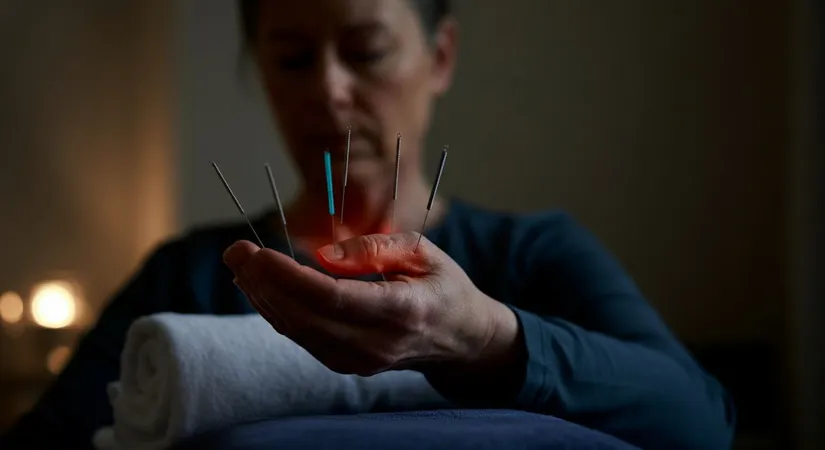British Acupuncture Council: Unlocking the Secrets of Acupuncture Therapy
Explore the British Acupuncture Council's acupuncture therapy and find treatment near you.
The antiquity of acupuncture and its revered place within traditional Chinese medicine narrate a story of enduring efficacy and profound healing. The British Acupuncture Council stands as a stalwart institution safeguarding the interests of practitioners and patients alike, ensuring that this ancient therapy finds its rightful place in modern healthcare. If you've ever wondered, what is acupuncture or whether acupuncture therapy could be your answer to holistic health, this guide illuminates the path.
The Science Behind Acupuncture: Bridging Tradition and Modern Medicine
Exploring Neurohormonal Pathways
Acupuncture's impact on neurohormonal pathways is a key area of scientific exploration. By stimulating specific points, acupuncture may influence the release of neurotransmitters like endorphins, which are natural painkillers. This mechanism helps explain its efficacy in pain relief, offering a biological basis for its traditional use.Key Biological Effects of Acupuncture
- Endorphin release: Acupuncture can increase endorphin levels, reducing pain perception.
- Serotonin modulation: It may affect serotonin levels, influencing mood and emotional health.
- Inflammation reduction: Studies suggest acupuncture can decrease inflammatory markers in the body.
Acupuncture's Role in Pain Management
Acupuncture is increasingly recognized for its role in managing chronic pain conditions. For instance, a study found that 50% of patients experienced significant pain reduction after acupuncture sessions. This highlights its potential as a complementary therapy in holistic health practices.How Acupuncture Enhances Healing
- Needle insertion: Fine needles are placed at specific points to stimulate energy flow.
- Neurohormonal response: The body releases neurotransmitters and hormones that aid healing.
- Improved circulation: Enhanced blood flow supports tissue repair and reduces inflammation.

Acupuncture in Integrated Health Systems: A Complementary Approach
Integrating Acupuncture with Conventional Medicine
Incorporating acupuncture into integrated health systems is gaining traction due to its complementary benefits. By aligning with conventional treatments, acupuncture can enhance overall patient care. For example, cancer centers often use acupuncture to alleviate chemotherapy-induced nausea, showcasing its supportive role in modern medicine.Benefits of Acupuncture in Integrated Health
- Enhanced pain management: Acupuncture complements analgesics, reducing the need for high-dose medications.
- Improved patient outcomes: Patients report better quality of life when acupuncture is part of their treatment plan.
- Holistic care approach: Acupuncture addresses physical and emotional health, supporting comprehensive care.
Acupuncture's Role in Multidisciplinary Teams
Acupuncture practitioners are increasingly part of multidisciplinary healthcare teams. Their expertise in traditional Chinese medicine offers unique insights into patient care. For instance, in rehabilitation settings, acupuncture aids in reducing muscle tension and promoting recovery, highlighting its value in diverse medical fields.Steps to Integrate Acupuncture in Healthcare
- Assessment: Evaluate patient needs and determine if acupuncture is a suitable complementary therapy.
- Collaboration: Work with healthcare providers to create a cohesive treatment plan.
- Implementation: Incorporate acupuncture sessions into the patient's overall care regimen.

Holistic Health Through Traditional Chinese Medicine: A Comprehensive Approach
Understanding the Core Principles of TCM
Traditional Chinese Medicine (TCM) is rooted in the philosophy of balance and harmony within the body. It emphasizes the interconnectedness of physical, emotional, and spiritual health. For example, TCM views the body as an ecosystem where organs and systems work synergistically, much like a well-tuned orchestra.Key Components of TCM
- Herbal Medicine: Utilizes plant-based remedies to restore balance and treat ailments.
- Tai Chi: A form of exercise that promotes physical and mental relaxation.
- Dietary Guidelines: Focuses on nutrition tailored to individual health needs.
The Role of Acupuncture in TCM
Acupuncture is a pivotal element of TCM, used to stimulate the body's energy flow or "Qi." By inserting fine needles at specific points, acupuncture aims to correct imbalances and promote healing. For instance, it is often employed to alleviate stress and enhance mental clarity.Steps to Implement TCM in Daily Life
- Consultation: Seek guidance from a certified TCM practitioner to assess health needs.
- Personalized Plan: Develop a tailored regimen incorporating TCM practices like acupuncture and herbal remedies.
- Regular Practice: Integrate TCM techniques into daily routines for sustained well-being.
Choosing the Right Acupuncture Clinic: Key Considerations
Evaluating Practitioner Credentials
When selecting an acupuncture clinic, verifying practitioner credentials is crucial. Ensure they are certified by reputable organizations like the British Acupuncture Council. This certification guarantees adherence to professional standards, ensuring safe and effective treatments.Essential Factors for Selecting an Acupuncture Clinic
- Accreditation: Choose clinics with practitioners certified by recognized bodies for quality assurance.
- Experience: Opt for practitioners with extensive experience in treating specific conditions.
- Patient Reviews: Consider feedback from previous patients to gauge satisfaction and outcomes.
Understanding Treatment Approaches
Different clinics may offer varied acupuncture techniques. Some focus on traditional Chinese methods, while others integrate modern approaches. Understanding these differences helps you choose a clinic that aligns with your health goals and preferences.Steps to Find the Right Acupuncture Clinic
- Research: Investigate clinics in your area and their offered services.
- Consultation: Schedule initial consultations to discuss treatment plans and practitioner expertise.
- Decision: Choose a clinic that meets your needs and provides a comfortable environment.
Neurohormonal Pathways in Acupuncture: A Modern Exploration
Acupuncture's influence on neurohormonal pathways is a significant area of study, revealing its potential to modulate neurotransmitter release such as endorphins and serotonin. This understanding provides a scientific basis for its traditional use in pain relief and mood enhancement, showcasing its integration into modern medical practices.
The British Acupuncture Council plays a pivotal role in maintaining high standards for practitioners, ensuring that acupuncture is practiced safely and effectively. Their certification is a testament to the practitioner's adherence to professional and ethical guidelines, reinforcing trust in this ancient therapy.
Holistic Health Through Traditional Chinese Medicine
Traditional Chinese Medicine, with acupuncture as a core component, emphasizes balance and harmony within the body. This holistic approach not only addresses symptoms but also targets root causes, fostering overall wellness and aligning with modern health philosophies.
Patients often report improved quality of life when acupuncture is part of their treatment plan, reflecting its efficacy in addressing both physical and emotional health. The British Acupuncture Council ensures that these practices adhere to high ethical standards, providing safe and effective care.
Frequently Asked Questions
What is acupuncture and how does it work?
Acupuncture is a traditional Chinese medicine practice that involves inserting fine needles into specific points on the body to stimulate energy flow, known as "Qi." It works by influencing neurohormonal pathways, potentially releasing neurotransmitters like endorphins and serotonin, which help in pain relief and mood enhancement.
Is acupuncture therapy safe?
Yes, acupuncture therapy is generally considered safe when performed by certified practitioners, such as those accredited by the British Acupuncture Council. These professionals adhere to high ethical standards, ensuring safe and effective treatments. However, it's essential to choose a reputable clinic to minimize any risks.
Can acupuncture help with pain relief?
Acupuncture is recognized for its efficacy in pain management, particularly for chronic pain conditions. By stimulating specific points, it can increase endorphin levels and improve circulation, offering a complementary approach to traditional pain relief methods and reducing the need for high-dose medications.
How does acupuncture integrate with conventional medicine?
Acupuncture is increasingly integrated into conventional healthcare systems due to its complementary benefits. It is often used alongside traditional treatments to enhance patient care, such as alleviating chemotherapy-induced nausea in cancer centers, thereby improving overall patient outcomes and quality of life.
What should I consider when choosing an acupuncture clinic?
When selecting an acupuncture clinic, consider practitioner credentials, such as certification by the British Acupuncture Council, experience in treating specific conditions, and patient reviews. Understanding the clinic's treatment approaches, whether traditional or modern, can also help align with your health goals.
Discover the Path to 'Healthy Beauty' with estethica's Expert Care. Call Now for Your Free Consultation!
📞 Speak with Our Specialists Today!
Fill in the Form
We call you immediately